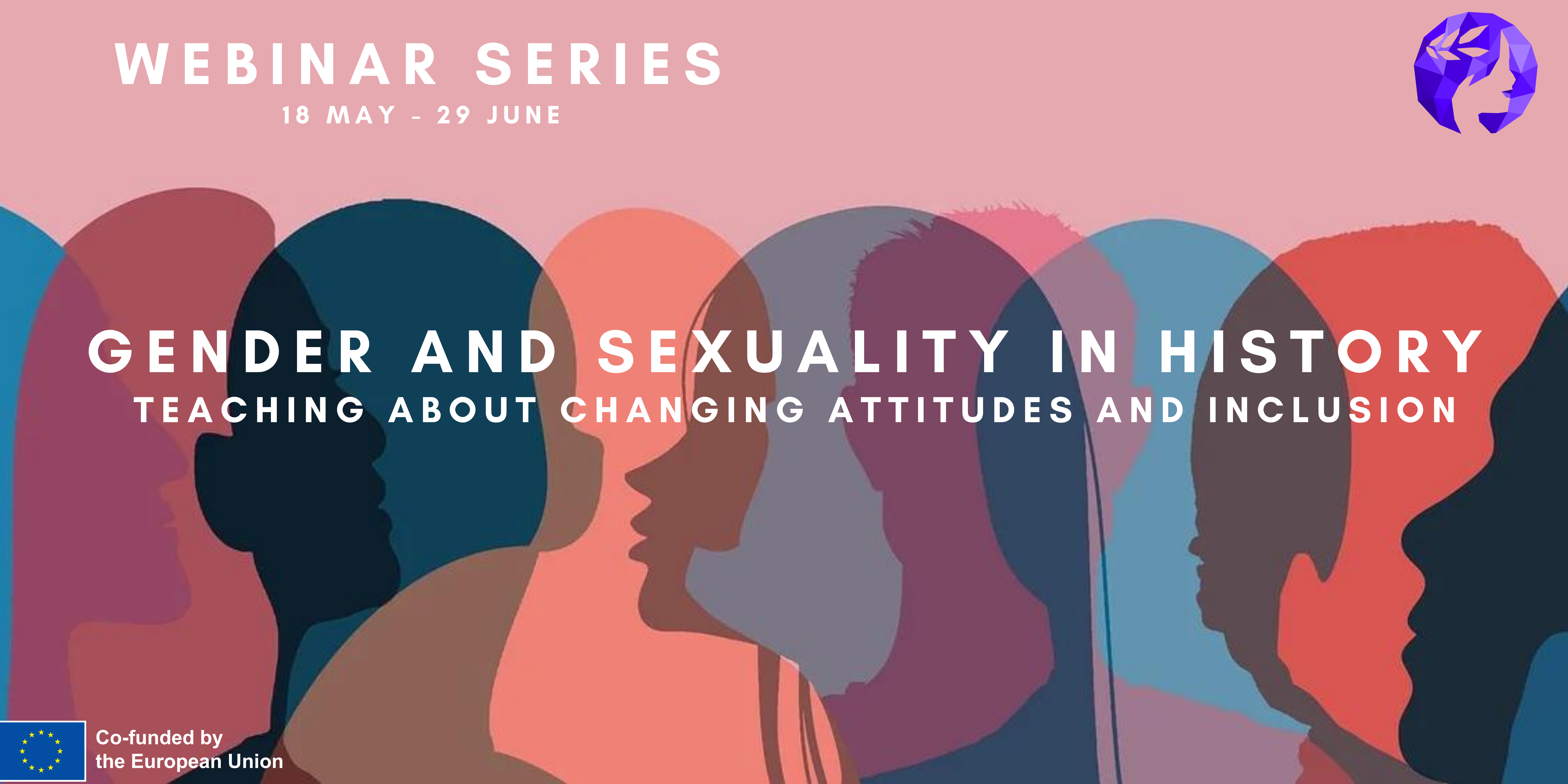

Gender and Sexuality in History: Teaching about Changing Attitudes and Inclusion
May 18, 2022 @ 5:00 pm - June 29, 2022 @ 6:30 pm
About the Webinar Series
How can we teach students an inclusive past in relation to gender and sexuality? How can we provide them with a representative history that encourages them to be active citizens and political leaders in the future?
Until today, history curricula still mostly focus on high politics, diplomatic and military history, prioritising male-dominated narratives that marginalise the role of women and gender-nonconforming individuals. This, unfortunately, has contributed to undermining many pupils’ ambition and self-respect, thus also their political engagement and active citizenship. Citizens’ participation in politics is essential to ensuring a robust and healthy democracy – when citizens become complacent, indifferent, or otherwise unengaged, the well-being of a democracy suffers as voices go unheard and needs unmet. This is still the case with many women and many members of the LGBTQI+ community. While there are many exceptions, the overall representation of women and members of the LGBTQI+ community is still poor in the fora of political decision-making at local, national, and European levels.
In this webinar series, we seek to bring more voices to the foreground during history lessons, and explore teaching strategies and tools that promote gender inclusivity. Between May and June 2022, we will welcome 30 motivated history and citizenship educators from all across the world to engage in interesting discussions, join active workshops, and enjoy networking opportunities.
The webinar series will reflect on a series of key challenges and strategies that can foster inclusive history education, especially in relation to increasing the visibility of women in school curricula and matters of sex and gender in society across time. We will tackle two main questions:
- What does it mean to promote inclusive and representative history in our classroom, especially in relation to sex and gender?
- What is Gender Mainstreaming, and what tools can we use to effectively mainstream gender in our history lessons?
Structure
The webinar series will consist of five online sessions, taking place at 17:00 – 18:30 Amsterdam time.
- Keynote Lecture: Gender and Sexuality in History – May 18, 2022, hosted by Prof. Dr. Claudia Jarzebowski
- Active Workshop: Gender and Kingship: Visual Representation in Eighteenth Century France – June 1, 2022, hosted by Stefania Gargioni
- Active Workshop: Talking Gender Diversity and Sexuality: Including 2SLGBTQ+ Stories In The Humanities Classroom – June 8, 2022, hosted by Gab Rogers
- Active Workshop: Do We Still Need Feminism? – June 15, 2022, hosted by Isabela Miron
- Sharing and Networking Session: How do members of the EuroClio Community teach history in a gender-inclusive and representative way? – June 29, 2022, moderated by Alice Modena
_______________________________________________
The webinar series will open with a Keynote Lecture, hosted by Prof. Dr. Claudia Jarzebowski. During the lecture, participants will explore the current state of women and gender history, talking about intersectionality and what steps need to be taken to mainstream gender inclusion in history classrooms.
Stefania’s workshop titled Gender and Kingship: Visual Representation in Eighteenth Century France will look at representations of gender and kingship in early modern France, using a scheme of work on the French Revolution. By looking at a set of pictorial sources (for example, portrait and original cartoon), she will demonstrate how the representations of monarchs – both Louis XVI and Marie Antoinette – were strongly related to ideas of femininity and masculinity. The source will show how, in the Revolutionary period, the criticism against the monarchy was also conveyed through derogatory views of Louis XIV’s masculinity and Marie Antoinette’s femininity.
Gab Rogers’ workshop, titled Talking Gender Diversity and Sexuality: Including 2SLGBTQ+ Stories In The Humanities Classroom, will explain and demonstrate how to integrate Queer content and inclusion into humanities classrooms. We will begin with a discussion on modern terminology and historical language, followed by general and local Queer examples. The webinar will conclude with an active workshop on practicing contextualizing diverse sources. Participants will leave this webinar feeling more prepared, equipped, and able to tackle meaningful Queer affirmation in their classrooms.
In history and across many cultures women have been often seen as second-class citizens. But History gives us a sense of identity and History teachers need to give students role models, to educate them not to perpetuate the inequality of the past. Isabela’s workshop, titled Do We Still Need Feminism?, aims to find the best teaching techniques to educate students in the spirit of gender equality, respect for human rights and tolerance, to make space for women in the stories we tell for the future. Let’s find out if we still need feminism!
The webinar series will end with a sharing and networking session, facilitated by the EuroClio staff, on the topic of “How do members of the EuroClio community teach history in a gender-inclusive and representative way?”. In this session, participants will have the possibility to present their own teaching approaches, share challenges that they are encountering, and answer the dreaded question “where do we go from here?”.
The webinar series will reflect on a series of key challenges and strategies that can foster the promotion of inclusive history education, especially in relation to increasing the visibility of women in school curricular and matters of sex and gender in society across time.
The preparation of teachers and pupils alike with tools, aimed at bringing more voices to the foreground during history lessons. The tools and strategies shared during the webinar series will be presented in the context of gender inclusion, but can be used also in conjunction with other topics.
